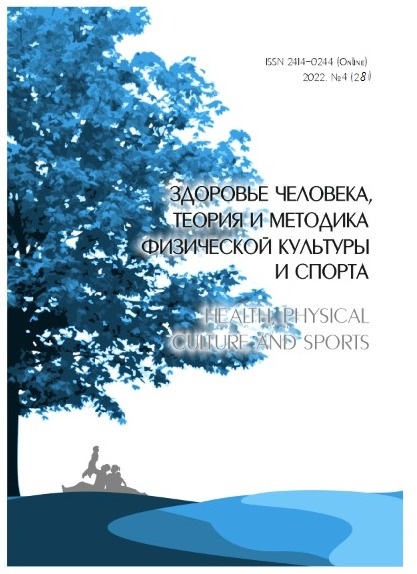DESIGNING PHYSICAL SELF-IMPROVEMENT AS A TOOL FOR MIRROR INDIVIDUALIZATION OF FORMATION PHYSICAL CULTURE OF STUDENTS' PERSONALITY
Abstract
Annotation To increase the effectiveness of solving the problem of forming the physical culture of students' personality, a system of mirror individualization has been developed. This system assumes the rejection of direct consideration of the individual characteristics of the student and the construction of individualizing conditions that encourage the subject of training to act in accordance with individual potentials, to act in an individual way, to reveal individuality. This determines an individualized way to achieve a pedagogical result – which is the generalized essence of individualization.
As a methodological technique for solving the designated tasks, it is proposed to use the design of a system for students of their physical self-improvement. Such a design will require the student to show an active position, independence, creativity. The project of self-improvement in the field of physical culture includes the following components used as semantic supports: assessment of students' own physical conditions, level of health, amount of motor baggage; correlation of the level of the qualities assessed above with the necessary for the intended work activity and other important life circumstances; determination of the goals and objectives of physical improvement; search for means of physical self-improvement; determination of the criterion for achieving the goals.
The use of the presented methodology in physical education classes at Altai State University aroused the interest of students, affected the emotional mood, positively affected the attendance of classes and their quality.
Thus, we can talk about replenishing the arsenal of mirror individualization tools and the prospects for their further improvement. And also pay attention to the fact that there are real prerequisites for the implementation of deep individualization of the process of formation of physical culture of the individual, effective influence on the motivational sphere of the student. This can be considered as certain steps to bridge the gap between the theory and practice of fostering a productive attitude to physical culture in officially regulated classes at the university.
Downloads
References
Anitsoeva L., Pervushina A. (2019). Sovremennie usloviya razvitiya fizicheskogo vospitaniya v rossiiskih vuzah _na primere Sankt_peterburgskogo gumanitarnogo universiteta prof_soyuzov. [Modern conditions for the development of physical edu-cation in Russian universities (on the example of the St. Petersburg Humanitarian University of Pro-fessional Unions)] Zdorove cheloveka_ teoriya i metodika fizicheskoi kulturi i sporta [Health, Physical Culture and Sports], No. 3, pp. 3-15. URL: http://journal.asu.ru/zosh/article/view/6418 (in Russian).
Belousko D. V. (2016). Urovni individualizacii fizkulturnogo vospitaniya [ Levels of individualization of physical education]. Zdorove che_loveka_ teoriya i metodika fizicheskoi kulturi i sporta [Human health, theory and methodology of physical culture and sports], No. 1, pp. 19-23. URL: http://journal.asu.ru/index.php/zosh/issue/view/59/showToc (in Russian).
Belousko D. V. (2017). Osnovnie aspekti fizkulturnogo vospitaniya v svete teorii i prak_tiki [The main aspects of physical education in the light of theory and practice]. Zdorove cheloveka_ teoriya i metodika fizicheskoi kulturi i sporta [Human health, theory and methodology of physical culture and sports], No. 1, pp. 30-38. URL: http://journal.asu.ru/zosh/article/view/1736 (in Russian).
Belousko D.V. (2017). Zerkalnaya individualizaciya [Mirror individualization]. Zdorove cheloveka_ teoriya i metodika fizicheskoi kulturi i sporta [Health, Physical Culture and Sports], No. 4, pp. 36-43. URL: http://journal.asu.ru/index.php/zosh/issue/view/213 (in Russian).
Bykov V.S., Yarushin S.A. (2018). Formirovanie potrebnosti v fizicheskom samovospitanii u studentov [Formation of the need for physical self-education among students]. Fizicheskaya kultura. Sport. Turizm. Dvigatelnaya rekreaciya [Physical culture. Sport. Tourism. Motor recreation], No. 1, pp. 7-12. (in Russian).
Vorontsov P.G., Deis D.A., Labygina N.M., Nedorezkov K.V. (2020). Cennostnii potencial fizicheskoi kulturi v sisteme professionalnoi podgotovki studentov medicinskogo universiteta [Value potential of physical culture in the system of professional training of medical university students]. Filosofiya obrazovaniya [Philosophy of Education], No. 1. pp. 81-93 (in Russian).
Nagovitsin R.S. (2014). Konceptualnie osnovi formirovaniya fizicheskoi kulturi lichno_sti studenta na osnove mobilnogo obucheniya [Conceptual foundations of the formation of physical culture of a student's personality based on mobile learning]. Teoriya i praktika fizicheskoi kulturi [Theory and practice of physical culture], No. 10, pp. 11-14. (in Russian).
Usselemova N. A., Usselemov S. V. (2020). Izuchenie opita fizkulturno_sportivnoi deya_telnosti studentov tehnicheskogo vuza [Studying the experience of physical culture and sports activity of students of a technical university]. Zdorove cheloveka_ teoriya i metodika fizicheskoi kulturi i sporta [Health, Physical Culture and Sports], No. 3, pp. 86-96. URL: http://journal.asu.ru/zosh/article/view/8133 (in Russian).
An author should not normally publish manuscripts describing essentially the same research in multiple journals or publication venues. Such redundant publication is generally considered to constitute unethical publishing behavior, and if discovered may result in a manuscript under consideration being rejected, or a published article being retracted.
Authors of manuscripts reporting on original research should present an accurate account of the work performed, accompanied by an objective discussion of its significance. Underlying data should be represented accurately in the manuscript. The manuscript should contain sufficient detail and references to permit others to replicate the work. The fabrication of results and the making of fraudulent or knowingly inaccurate statements constitute unethical behavior and may be cause for rejection or retraction of a manuscript or published article.





